AI at Work
How to Use AI Email Generators for Marketing and Sales – A Complete Guide on AI for Email Writing

Akshita Sharma · Content Marketing Associate
December 5th, 2024 · 10 min read
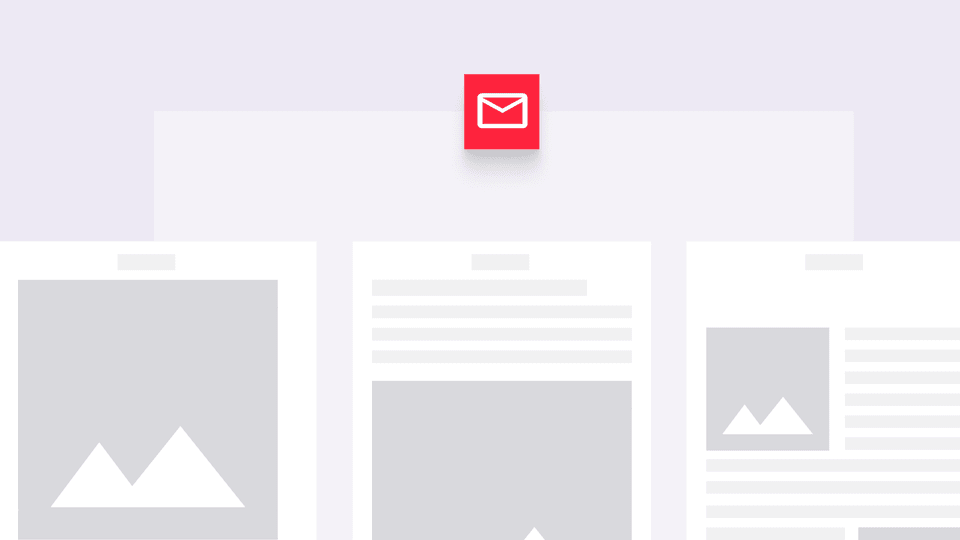
Despite the constant evolution of digital marketing channels, email marketing continues to be one of the most effective channels for engagement, delivering an impressive 36:1 return on investment. That's 3600% ROI. The reason is simple: email enables direct, personalized communication with your audience in the space they check multiple times daily—their inbox. Now, AI email generators are making this powerful channel even more effective by enabling marketing teams to create and personalize emails at scale.
In this article, we'll show you how to integrate an AI email generator into your email marketing strategy, walking you through the specific steps to use AI to create emails complete with visuals and copy.
What is an AI email generator?
How to create marketing and sales emails with an AI email generator
How to repurpose content into emails with an AI email generator
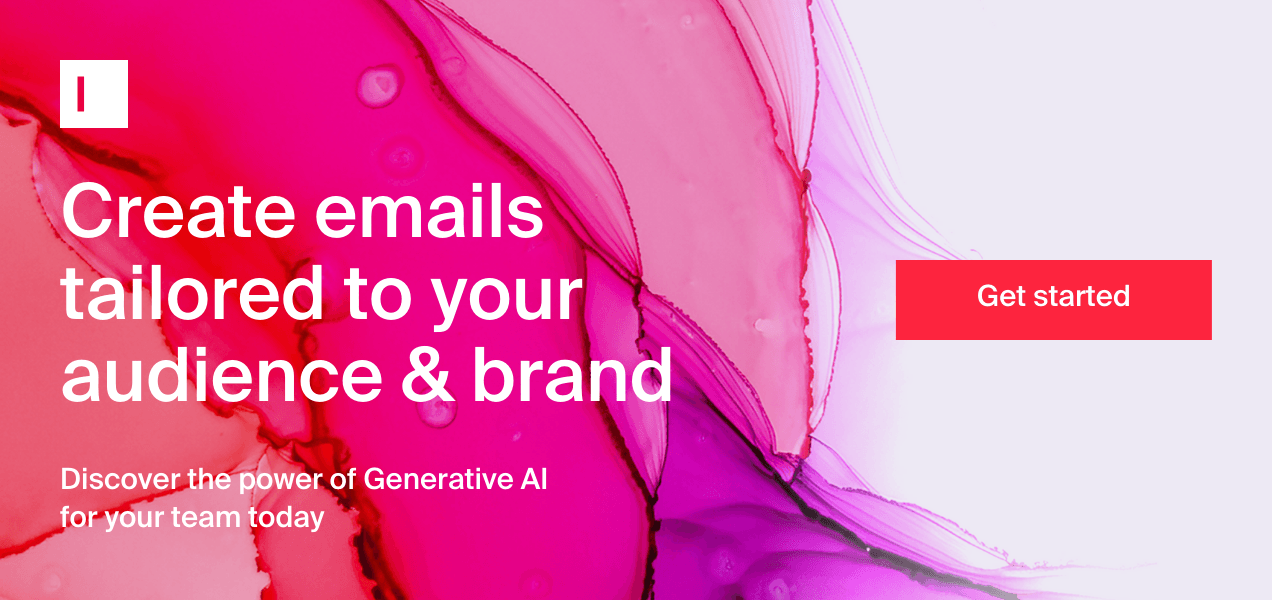
What is an AI email generator?
An AI email generator is more than just another automation tool—it's a sophisticated content partner that helps create complete email campaigns from subject lines to CTAs. These systems can generate fresh content, optimize existing copy, and personalize messages across different audience segments.
Typeface's platform offers few different approaches for creating marketing emails:
AI email writing templates: A comprehensive library of frameworks designed for specific marketing objectives, from nurture campaigns to product launches
Content repurposing templates: Advanced features that help you repurpose existing marketing assets into engaging email formats while maintaining brand consistency
Generate text template: Input custom AI email prompts to create and test entire email campaigns, including everything from subject lines to visuals.
This AI content platform makes it easier to create content tailored to various stages of your customer's journey. From a welcoming series and new product launches to abandoned cart reminder emails, you can customize content for each specific audience segment and stage. Once everything is ready, you can publish your content directly on your platforms, guiding your audience smoothly from exploration to purchase with well-planned emails. This makes Typeface particularly useful for professionals who need to frequently send large volumes of emails, like those in marketing, sales, or customer service operations.
How to create marketing and sales emails with an AI email generator
Here's how leading marketing teams are leveraging AI email templates to transform their email marketing:
1. Choose an AI email writing template
Start by choosing a suitable AI template for the email content you wish to create. Explore the template library on Typeface or use the search bar at the top to find the right AI template. You'll find AI templates for sales emails, marketing emails, email subject lines, and more.

You can also access these AI templates directly from the document you’re working on.
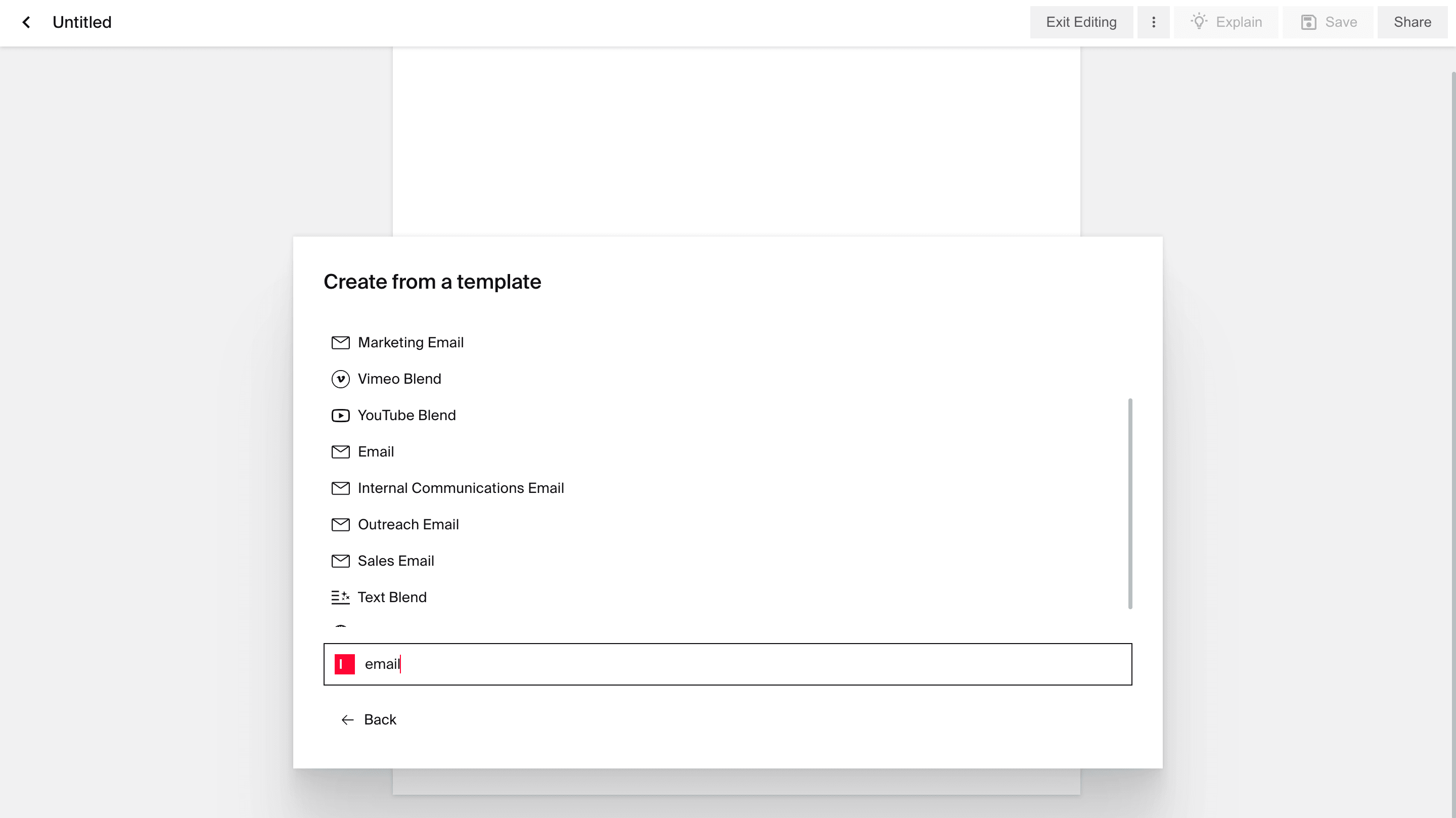
2. Define the email's purpose, add context, and describe your CTA
After opening an AI template, you can start adding your inputs. First, define the purpose of the email and what you hope to achieve with it. Whether you're promoting a new product, nurturing leads, or simply engaging with your audience, help the AI understand the primary goal of your email.
To ensure your message is relevant to your readers, you'll also need to provide some context for the email. Here, you can include background information on how your product or service can solve specific problems, elaborate on the email topic, or add industry data or recent trends that align with your message. You can also include information referencing a recent conversation, meeting, or shared interest that relates to the email's contents.
Finally specify any actions you want the recipient to take, like clicking a link, replying to the email, downloading content, or anything else.

3. Set targeting and structural parameters for personalizing the email
Once you've finished adding your inputs, you can adjust the structural and targeting parameters in the settings to personalize your email content. Here, you have the option to set the word count. You can also choose your target audience from the preset options saved with Typeface or imported from your CDP or create a new segment by specifying details about their demographic details, preferences, interests, and behaviors.

To enhance your content personalization further, save your brand kit on the platform. This is where you establish your brand's tone, voice, and visual style to ensure your content is consistent. You can also choose the language for your email content using LLM's built-in translation features to adapt the content to the recipient's language of choice.
4. Add any documents relevant to your email
To make your sales and marketing email content more targeted, provide supporting documents for the AI to use. Think about uploading your latest whitepaper, sales decks filled with specific data, or customer success stories.
For instance, if you're crafting a marketing email introducing a new product, upload your product documentation to ensure your email contains all the important features and specifics.

Typeface uses these materials to weave in relevant examples and insights — all while maintaining your brand's perspective.
5. Generate and refine the email content
After you've uploaded any documents, you can generate your email.

The AI will use the data and instructions you've provided to create a contextual first draft. At this point, it’s important to review and edit the content to ensure it checks all the boxes, whether that’s in terms of voice, content, personalization, or any other aspect.
The “Explain” feature on Typeface can be incredibly useful during the review process. It will give you improvement suggestions and also show you how well your content is optimized in terms of brand guidelines, audience preferences, and other specific metrics (like engagement, lead generation, retention, and more).

If the initial subject line doesn't meet your expectations, you can come up with more variations using the "Email Subject Line" template. For improving and regenerating any other section, there's the Typeface Generative Refine tool.

Elevate your email campaigns further by integrating AI-generated visuals directly within your workflow. Typeface's multimodal platform seamlessly extends beyond text generation to create custom imagery for your email such as banner headers or images for the body of the email. Whether you're drawing inspiration from our AI Visual Inspiration Studio or starting from scratch with prompts, you can ensure every email campaign maintains visual consistency while standing out in crowded inboxes.

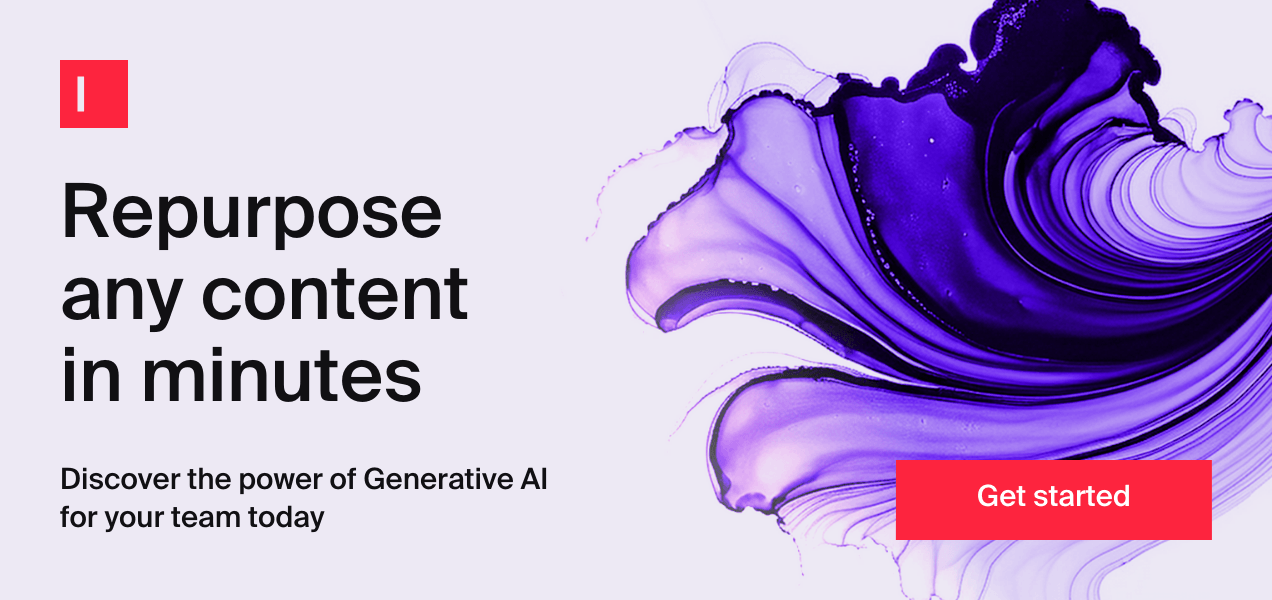
How to repurpose content into emails with an AI email generator
In addition to using AI templates to generate emails, there's another way you can use an AI email generator to create sales and marketing emails. Upload your existing content, like a whitepaper, sales call transcript, or video, and use Typeface’s Blend Templates to repurpose it into different email formats. Here's how it works:
1. Choose a content blend template
Typeface's AI email generator offers various content blend tools that allow you to transform different types of content into email content. Depending on the source content, you can select from the following options:
Text Blend: Suitable for transforming long-form articles or written reports into concise email formats
Web Blend: Perfect for converting website landing pages or blog content URLs into marketing or sales emails
YouTube/Vimeo Blend: Ideal for turning video content like keynotes, webinars, or trainings into email content
Podcast Blend: Best for turning audio content like podcasts into written text for emails
Document Transform: Repurpose any document into marketing or sales emails

Choosing the right AI content repurposing templates helps preserve the core message of your content while customizing it for email format.
2. State your goal for repurposing the content
Once you've selected a Blend template, you can specify what you aim to achieve with the repurposed content, like creating a sales email, newsletter, or anything else.

Knowing your goal for repurposing the content will guide the AI in selecting the most relevant parts of the original material to highlight in your email.
3. Add source content links or text
Next, provide the AI email generator with the existing content for repurposing:
Input a URL for Web, Video, and Podcast Blend templates to pull content directly from the source

For Text Blend template, you can simply paste the content
For the Document Transform template, you can upload URLs or files
Once you've added the source content, you can set the targeting and structural parameters to personalize the email content (like we did in the first method).
4. Generate your email
Once you've provided all your inputs, initiate the email generation process. The AI tool will analyze the source content, extract key insights, and formulate a draft email that aligns with the purpose you’ve stated. The draft will include a subject line, preheader, essential themes, call-to-action, and a summary of the original content.

5. Edit email content
The last step is to refine the email to ensure it is precise and engaging. The editing process will be similar to the first method, but here are a few things to keep in mind:
Review the content for factual accuracy and correct any context deviations
Personalize certain sections so that they fit better with the campaign scope and audience
Enhance emails with visuals to capture reader interest
By taking the time to edit and refine the content, you ensure that your repurposed content not only retains its original value but also effectively communicates with your audience in a format they appreciate.
Transform your email marketing strategy with AI
Email marketing's complexity has grown exponentially—from personalization demands and audience segmentation to content velocity and brand consistency. AI email generation fundamentally changes this equation, not by replacing marketers but by amplifying their capabilities. Whether you're scaling outbound sales campaigns, localizing product announcements across markets, or nurturing complex B2B relationships, AI helps marketing teams deliver personalized communications that drive measurable results.
Typeface's platform goes beyond basic automation by understanding your brand voice, marketing objectives, and audience segments. The results are tangible: faster campaign deployment, more personalized messaging at scale, and consistently higher engagement rates. But perhaps most importantly, it frees marketing teams to focus on strategy and creative direction rather than production logistics.
Ready to transform how your team approaches email marketing? Try Typeface for free or schedule a demo today to experience how easy it is to elevate your email marketing strategy to new heights.
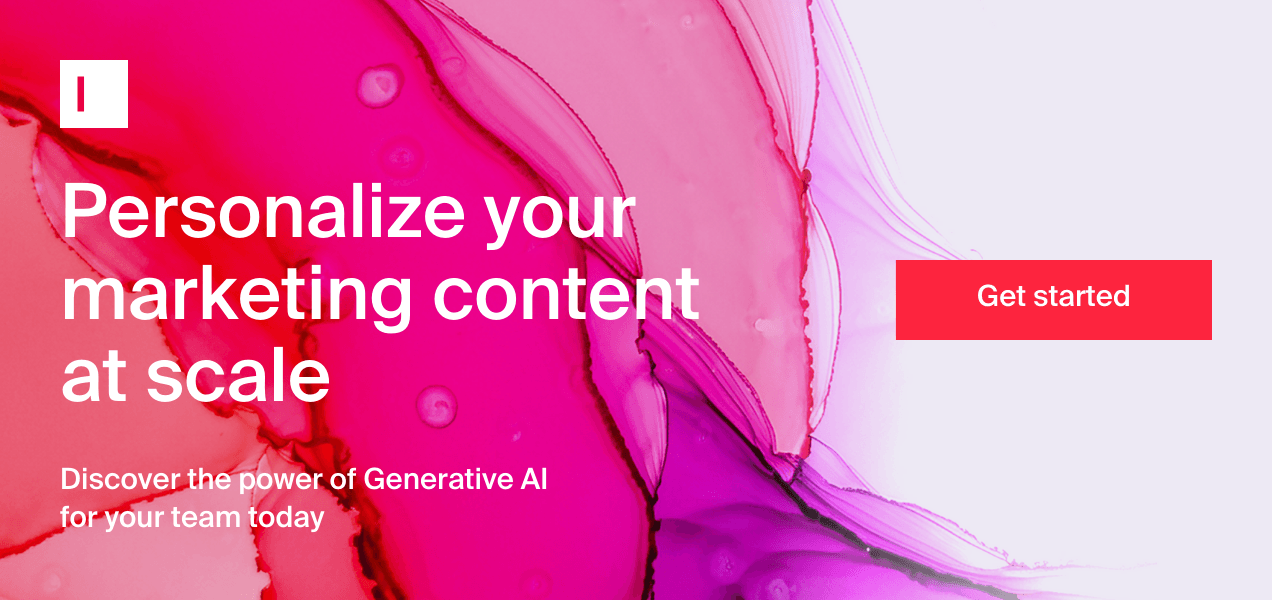
Share
Related articles

AI at Work
7 Generative AI Use Cases in Enterprise Marketing

Neelam Goswami · Content Marketing Associate
November 12th, 2024 · 15 min read

AI at Work
AI Personalization in Marketing - Creating Tailored Content for Diverse Audiences

Neelam Goswami · Content Marketing Associate
November 28th, 2024 · 11 min read
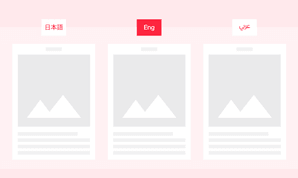
AI at Work
AI-Powered Content Localization: How Enterprise Brands Scale Content Marketing Without Sacrificing Local Relevance

Neelam Goswami · Content Marketing Associate
December 3rd, 2024 · 13 min read